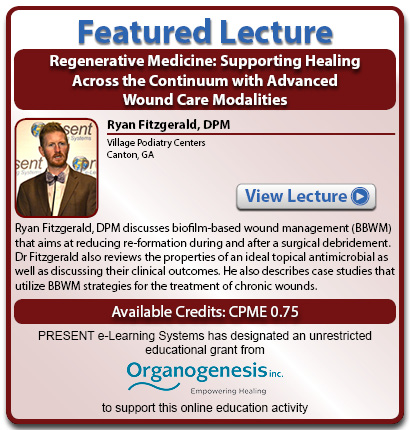|
|
|
|
|
|
|
|
|
|
|
How would you answer this question about yourself? For those of us who spend a significant amount of our professional lives teaching others, whether as college classroom teacher, clinician, residency attending, or fellowship physician, this is perhaps the most important skill. If, as a teacher, you somehow teach ineffectively, then you’ve failed at your principle job. The problem is, being a good teacher is a somewhat ephemeral and ill-defined endeavor, which is different to some extent for each of our students. Some trainees will benefit from an authoritarian – intimidating and dictatorial – while others will respond better to a softer or more democratic/Socratic approach.
|
|
Get a steady stream of all the NEW PRESENT Podiatry e-Learning by
becoming our Facebook Fan.
Effective e-Learning and a Colleague Network awaits you.
|
|
|
|
When one speaks with students it does seem, though, that there are some general principles or characteristics of good teaching. Sutkin and colleagues performed a systematic review of the literature, attempting to answer this question as it relates to clinical teaching.1 Despite the specificity of the setting – the clinical arena – you’ll note the generalizability of their findings. These researchers first discussed amongst themselves common themes pertaining to a “good clinical teacher.” They found five primary themes:
-
Relationships – Teaching as a “bidirectional exchange” with trust and individual attention appreciated by students.
-
Emotional activation – The ability to arouse enthusiasm.
-
Generativity – The teaching process changes as the trainee matures, and educational methods change to suit the trainee.
-
Self-awareness – Self-reflecting on the teaching process and adjusting methods as necessary.
-
Competence – The teacher being a master of the topic to be taught.
|
|
|
It’s pretty clear that these characteristics fall into cognitive and noncognitive categories. Think of the best teacher you experienced during your training. You’ll find that teacher was usually highly knowledgeable about their field but also had that social spark that leads to a high-quality interaction.
|
|
Subscribe Now To see Conference Videos, Interviews, Sneak Peek Lecture Videos, and More!
|
|
|
|
Sutkin’s research group then performed a systematic review of the literature, finding 68 articles that satisfied their inclusion criteria (26 published before 1966 and 42 published after 1966). Interestingly, all of the articles except one published before 1966 were essays rather than research studies. The common themes discovered during this search were:
-
Medical knowledge
-
Clinical and technical skills/competence, clinical reasoning
-
Positive relationships with students, supportive learning environment
-
Communication skills
-
Enthusiasm (for medicine, teaching, and in general)
|
|
|
A recent survey study of 321 preclinical and clinical medical students found trainees valued teachers who were inspirational with a deeper knowledge of the subject and ability to explain it, a student-friendly nature, and an ability to communicate well.2
|
|
|
|
|
The one conclusion from this research, general though it may be, is “excellent teaching…transcends ordinary teaching and is characterized by inspiring, supporting, actively involving, and communicating with students”.1 Much easier said than done.
|
|
|
How to Be a Good Teacher
It’s not enough for us to simply mimic those characteristics identified in good teachers. Clinical teachers are pulled in many directions, and we don’t often have the leisure to simply stop what we’re doing to teach. Clinical volume, procedure completion, outside meetings, and many other responsibilities pull at our attention. Here are some suggestions to help all of us improve our clinical teaching.
|
|
Join Now To get the Latest News, Press Releases, Announcements, Conference Information, and More!
|
|
|
-
Recall your worst teacher - Think of all the things they did wrong. How did they make you feel? What did you promise yourself at the time about never being like that person? Now fast forward to the teacher you are now. Are you doing anything similar to that prior teacher? Reflect on the significant effect you have on your trainees, and do the opposite of that worst teacher.
-
Now think about the best teacher you’ve ever had - What did they do right? What exactly did they do to not only teach you something but inspire you to be your best?
-
Be genuinely interested in your students - You can’t teach well if you don’t care about your students. Remember the golden rule. How would you want to be treated if you were the trainee?
-
Don’t be afraid to be ignorant - in fact, embrace it. Not knowing the answer creates a wonderful opportunity for all involved to learn. Take this chance to help your trainees understand how to find an answer and what to do when the answer is unknown.
-
Create a quick mental map - of what you want your trainees to learn before an educational session (clinic, hospital, surgery, or classroom). For example, during a clinic, you might focus on diagnostic skills alone while de-emphasizing patient treatment. Between patients, your questions and discussion would then focus on this topic. Similarly, during surgery, perhaps one of your residents needs to work on dissection skills. Instead of having them do the entire case, have them focus on the dissection (taking a bit longer than usual), and then take the knife back for the rest of the case.
-
Tell your learners the plan - By communicating with them, your trainees will understand what you’re doing and focus themselves on your planned outcomes. They will also understand your expectations.
-
Look for teachable moments - Sometimes situations occur that create excellent opportunities to teach. If you’re not clear how to find teachable moments, an easy way is to look for errors by your trainees.
-
Create level-specific challenges - We all learn better when we are pushed just a little beyond our current capabilities. This will force a trainee to grow while also building self-confidence. Making a challenge too difficult usually ends in failure. Consider, for example, the exaggerated example of asking a first-year podiatry resident to do a skin-to-skin pantalar fusion procedure. This advanced procedure will require too many individual skills for a novice surgeon and will end with the surgeon having to take over and the trainee losing a learning opportunity.
-
Observe and question your learners - You can’t possibly know if your trainees are learning if you don’t see them doing skills and ask them questions that gauge their knowledge. Use this as a springboard to give constructive feedback and plan future learning activities.
|
|
|
|
|
Being a great teacher is an ongoing process to which all of us in medicine should pay more attention. It’s a hard, often thankless job, but with the potential for incredible satisfaction. Just observe how you feel when one of your trainees realizes they get it. The glint in the eye when understanding strikes. The look of pride in a successfully completed procedure. The moment when you realize that person you donated so much time and effort to is now a fully functioning and excellent physician. What could be better than that? Take a few minutes and analyze your own teaching; I’m sure each of us can find ways to improve and benefit our trainees.
|
|
|
|
-
Sutkin G, Wagner E, Harris I, Schiffer R. What Makes a Good Clinical Teacher in Medicine: A Review of the Literature. Acad Med. 2008 May;83(5):452-466.
Follow this link
-
Kumari KL, Rao PL, Sekhar RC, Elena GK. Qualities of best medical teacher: a student perceptive study. Int J Res Med Sci. 2016 Dec;4(12):5436-5439.
Follow this link
|
|
This ezine was made possible through the support of our sponsors:
Grand Sponsor
Major Sponsor
|
|
This email was sent to: %%Email Address%%
This email was sent by: %%Member_Busname%%
%%Member_Addr%% %%Member_City%%, %%Member_State%% %%Member_PostalCode%% %%Member_Country%%
We respect your right to privacy - view our policy
Unsubscribe
Update Profile
|
|




















